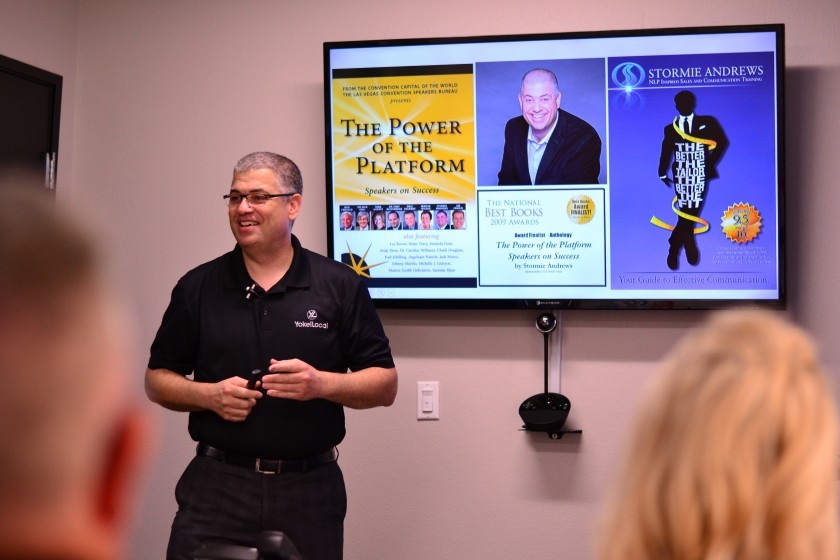Trailblazing DEI in Technology with Microsoft’s William A. Adams
Episode 143
Are you an Intrapreneur? Maybe you enjoy walking that fine line where you’re on edge, but people have confidence in you to keep handing you responsibility. Do you ever wonder how you can use that drive to empower and create change around you? You’re in luck!
As the Technical Advisor to the CTO at Microsoft, William A. Adams has an exciting job. Instead of working full-time on technical initiatives, he works primarily on people’s problems. Several years ago, he underwent a personal transformation that gave him new clarity and intention.
As a Black leader, William is on a mission not just to find the technical talent of color but to grow them.
Here are three reasons why you should listen to the complete episode:
- You will learn more about William’s early inventions and achievements and how he is now using that same drive to help with diversity and inclusion.
- William shares why he enjoys and excels in intrapreneurship.
- Find out the message and mission behind Techquity.
Episode Highlights
Who is William A. Adams
-
- William is the technical adviser to the CTO at Microsoft.
- Instead of working full-time on technical initiatives, he works mainly on people’s problems.
- He co-founded Microsoft’s leap apprenticeship program to help blacks, women, and other underrepresented communities get technical jobs.
- He’s helped Microsoft grow talent in primarily black areas like Kenya, Nigeria, and the US Virgin Islands.
- He has personally donated $200,000 to kickstart technology initiatives.
- He is an award-winning diversity and inclusion innovator, an engineering trailblazer, and a philanthropist.
William A. Adams’ backstory
-
- William got his first computer when he was 12 years old.
- He went to UC Berkeley, started a company with his brother, and did software for several years.
- In 1998, William joined Microsoft.
The precursor to instant messaging
-
- William has a patent on Livewire from 1994.
- The application was designed to work inside a real estate office.
- The front desk could communicate with someone in the back office through instant messaging.
- Livewire also allowed them to share media and voice recordings.
Working in technology in the 90s as a black man
-
- William A. Adams was the only black man in the room.
- He is in a Computer History Museum because there weren’t many blacks in tech.
- He didn’t work with any other black engineers at Microsoft from 1998 until five years ago.
Institutionalized biases
-
- Once institutions get a certain way, they reinforce that way.
- William explains that we do things that seem reasonable but don’t recognize their bias.
- Companies keep recruiting from the top 15 schools in the country that are only 1-2% black.
- A majority set will always exclude a minority set, and you must fight against it.
Owning a table
-
- William says you deserve more than a seat at the table. You need to own the table, own the wealth.
- We need to recognize that chasing someone else’s dream is hard, trying to catch up to where somebody’s already been.
- By the time you get a seat at that table, the meal will be over. So you need to create different tables.
Confidence in the black community as an intrapreneur
-
- William recalls being very arrogant and cocky. However, it would be viewed differently if he wasn’t black.
- William is rooted in self-determination.
- He grew up with the mantra that you must work twice as hard to get half as much.
- He drove his own intelligence and taught himself how to program when he was 12.
- William and his brother did groundbreaking, extraordinary, and different things with their business.
- People soon recognized this and offered them money, a marker of being on the right track.
What intrapreneurship is
-
- You don’t have to be on the frontier always because there’s a fine line between being a leader and being a troublemaker.
- Intrapreneurship is about walking that fine line where you’re on edge, but people have confidence in you and want to back you and support you.
Williams biggest regrets
-
- Jay Allard, the guy who started Xbox, approached William and asked if William would like to join Xbox and be the first engineering manager. William regrets declining.
- When on an interviewing team, William allowed fellow interviewers to convince him that one of the best programmers, a Pakistan woman, would not survive at Microsoft because she was so timid and quiet.
- Looking back, William kicks himself because the woman in Pakistan had survived to become one of the best programmers, and they thought she couldn’t survive in Microsoft.
William A. Adam’s #Techquity Mission
-
- Techquity is about owning technology, not just consuming it.
- William’s tribe is typically subject to the influence of the top 10 billionaires rather than being the influencers.
- The game right now is around tech. William explains we don’t have to be in the top 10 billionaires, but we have to be somewhere to influence policy.
- AI systems hyperinflate the biases, and unless someone is creating systems to counter biases, we’re just going to be subjected to them.
- Techquity is about leveraging technology to get an equity share and, therefore, a voice in the world.
- While we try not to be left behind even further, it’s also about recognizing the path to get there.
- Techquity is about identifying the people who want to be in the game and giving them the necessary resources.
Considering the possibilities of technology
-
- When thinking about technology, William says nobody is too old for anything.
- Automating things is finding your natural flow with the things you are confident doing.
What William would want to be remembered for
-
- William wouldn’t want to be remembered for his inventions or achievements; he just wants everyone to love each other.
- William wouldn’t want to be remembered for his inventions or achievements; he just wants everyone to love each other.
3 Powerful Quotes from this Episode
12:01 – “It’s hard chasing someone else’s dream and trying to catch up to where somebody’s already been. Create a different table.”
29:23 – “Techquity is all about saying, That’s the space. That’s where all the influence is. We need to have a voice in that space.”
34:41 – “You’re not dead yet, so you’re not too old for anything. You can never be too old to learn something new.”
Connect with William A. Adams
Enjoying The MindShift Podcast?
Click here to follow on Apple Podcasts. While there, please leave a 5-star rating and review. Also, if you haven’t done so already, join the free MindShift Community to connect with other like-minded people. Don’t forget to tag me @mrdarrellevans on Instagram.
Thanks for listening,
Darrell


